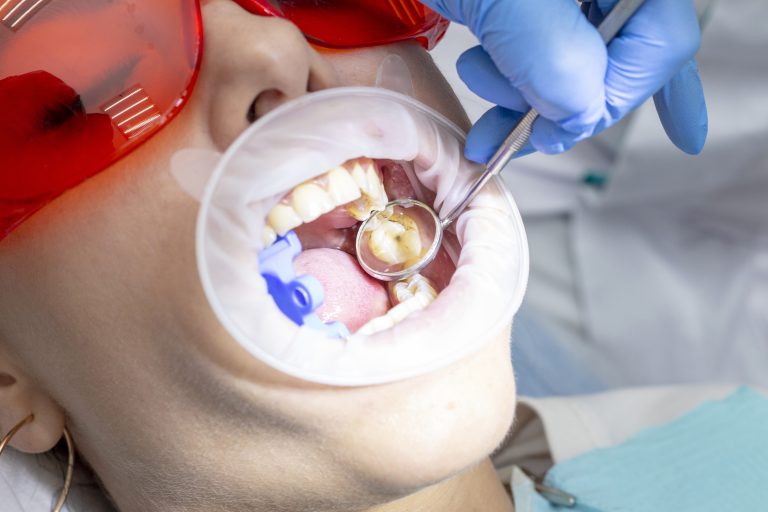


Frenektomi Nedir?
Frenektomi, dil veya dudak gibi bölgelerde bulunan frenulum adı verilen bağ dokusunun çıkarılması veya kesilmesi işlemidir. Frenulum, iki dokuyu bir arada tutan bir zar veya bağdır. Dil frenulumu dilin alt kısmında, üst dudak frenulumu ise üst dudak ve diş eti arasında bulunur.
Frenektomi Neden Yapılır?
Dil Problemleri:
Dil frenulumu kısa veya sıkı olduğunda, dil hareketleri kısıtlanabilir. Bu durum bebeklerde emme sırasında zorluk, çocuklarda konuşma problemleri ve yetişkinlerde dil hareketlerinde sınırlılık gibi sorunlara neden olabilir.
Dudak Problemleri:
Üst dudak frenulumu fazla gergin olduğunda, üst dudak ve diş eti arasında sıkışma meydana gelebilir. Bu durumda, özellikle ortodontik tedavi veya diş protezleri gerektiren durumlarda frenektomi yapılabilir.
Frenektomi Nasıl Yapılır?
Frenektomi genellikle lokal anestezi altında yapılır ve kısa süren bir işlemdir. İşlem aşağıdaki adımları içerir:
Hazırlık:
Hastanın bölgeye lokal anestezi uygulanır. Anestezi bölgesel olarak frenulumun bulunduğu bölgeye enjekte edilir.
Kesme veya Çıkarma:
Frenulum, kesilerek veya cerrahi aletlerle çıkarılarak çıkarılır. Bu adım, dil veya dudak frenulumunun durumuna bağlı olarak değişebilir.
Dikişler:
Gerektiğinde, kesilen veya çıkarılan bölge dikiş atılabilir. Dikişler genellikle kendi kendine eriyen malzemeler kullanılarak yapılır.
İyileşme Süreci:
İşlem sonrası, hastanın bölgeyi korumak için doktorun önerilerine uygun şekilde iyileşme sürecini takip etmesi gerekir. İyileşme süreci genellikle hızlıdır ve minimal ağrı ile birlikte geçer.
Frenektomi Sonrası İyileşme:
Frenektomi sonrası, hasta genellikle birkaç gün içinde normal günlük aktivitelere geri dönebilir. Ancak, doktorun önerilerine uygun şekilde yara bakımı yapılması ve belirli yiyecek veya içeceklerden kaçınılması gerekebilir. İyileşme süreci bireyden bireye değişebilir ve genellikle sorunsuzdur.
Frenektomi, dil veya dudak problemlerini çözmek ve hastanın yaşam kalitesini artırmak için etkili bir yöntemdir. Ancak her cerrahi müdahalede olduğu gibi, bazı riskler ve komplikasyonlar da olabilir. Bu nedenle, işlem öncesinde hastanın doktoru ile riskleri ve avantajları detaylı olarak tartışması önemlidir.
Bize Mesaj Gönderin
Randevu Saatleri
Pazartesi – Cuma: 08:00 – 18:00
Pazar günleri ve resmi tatillerde kapalıyız.
İletişim
Yeni Mahallesi İntizam Sokak No:7 Pendik / İstanbul
0216 390 95 80
0505 372 09 26
Hasta Yorumları
Kliniğimizde, sıcak bir karşılama, şeffaf iletişim ve üstün hizmet kalitesiyle, diş sağlığı konusundaki tüm ihtiyaçlarınıza cevap vermeye hazırız.
Kaplamalarımla alakalı gitmiştim kaplamalarımın altında kistler oluşmuştu. İmplant takıldı şuan çok memnunum .Esra hanımdan önce 3 -4 tane dişçiye gittim ama hep problemler çıkardılar kaplamayı takarken dişlerimi kökten kırdılar. En son Esra hanımı önerdiler gittim ve çok memnun kaldım . Eli çok hafif ve işi bilen bir hekim Kanal tedavisi ile dişlerimin tamamını kurtardı. yakınlarıma,aileme tavsiye ettim . Ailemden de gidenler var.

TR
Esra hanıma komşumun tavsiyesi üzerine gittim iyi ki tavsiye etmiş iyi ki gitmişim çok memnunum implant yaptırdım tedavim hala da devam ediyor çok içten bir doktor hastasına güven veriyor ve çok rahatlatıyor ben de herkese tavsiye ederim

TR
Sıkça Sorulan Sorular: “Frenektomi“
Frenektomi genellikle güvenli bir işlem olsa da, her cerrahi müdahalede olduğu gibi bazı riskler ve komplikasyonlar olabilir. Bu komplikasyonlar arasında enfeksiyon, kanama, dikişlerde açılma veya yaranın iyileşmemesi gibi durumlar yer alabilir.
İyileşme sürecinde, hastanın doktorun önerilerine uygun şekilde yara bakımı yapması ve belirli yiyecek veya içeceklerden kaçınması önemlidir. Ayrıca, işlem sonrası belirtilen ilaçları düzenli olarak kullanmak da önemlidir.
Frenektomi, dil veya dudak problemlerinin çözümü için yapılmalıdır. Özellikle dil frenulumu kısa veya sıkı olduğunda dil hareketleri kısıtlanıyorsa veya üst dudak frenulumu fazla gergin ise, frenektomi yapılması gerekebilir.
Frenektomi genellikle dil ve dudak hareketlerini serbest bırakarak konuşma ve yutma üzerinde olumlu bir etkiye sahiptir. Özellikle dil frenulumu sorunları olan kişilerde konuşma ve yutma yeteneklerinde iyileşme görülebilir.
